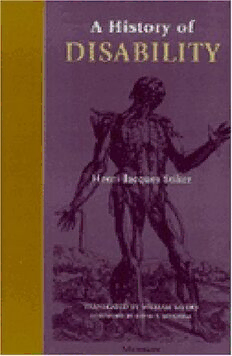
A History of Disability PDF
260 Pages·2000·21.497 MB·English
Most books are stored in the elastic cloud where traffic is expensive. For this reason, we have a limit on daily download.
Preview A History of Disability
Description:
The increasing numbers of scholars, policy-makers, and political activists who are concerned with questions of physical and cognitive disability will warmly welcome Henri-Jacques Stiker's book, the first to attempt to provide a framework for analyzing disability through the ages. Published in 1997 in France as Corps infirmes et soci?t?s and available now in an excellent English translation, the book traces the history of western cultural responses to disability, from ancient times to the present. In this volume, Stiker examines a fundamental issue in contemporary Western discourse on disability: the cultural assumption that equality/sameness/similarity is always desired by those in society. He highlights the consequences of such a mindset, illustrating the intolerance of diversity and individualism that arises from placing such importance on equality. Importantly, Stiker does not hesitate to assert his own stance on the issues he discusses: that difference is not only acceptable, but that it is desirable, that it is necessary. The author goes beyond anecdotal history to traverse a little known history, penetrating to the heart of collective attitudes and reflecting on elements of policy. The sweep is broad; from a rereading and reinterpretation of the Oedipus myth to current legislation regarding disablity, he proposes an analytical history that demonstrates how societies reveal themselves through their attitudes towards disability, at times in unexpected ways, since the study of detail is often the best entry into the whole of a culture. The book will be of interest to scholars of disability, historians, social scientists, cultural anthropologists, and those who are intrigued by the role that culture plays in the development of language and thought surrounding the disabled. Henri-Jacques Stiker is Director of Research and member of the department of the History and Civilization of Western Societies, University of Paris VII.
See more
The list of books you might like
Most books are stored in the elastic cloud where traffic is expensive. For this reason, we have a limit on daily download.
